托福综合写作常用词语及句型
- 格式:docx
- 大小:71.94 KB
- 文档页数:5
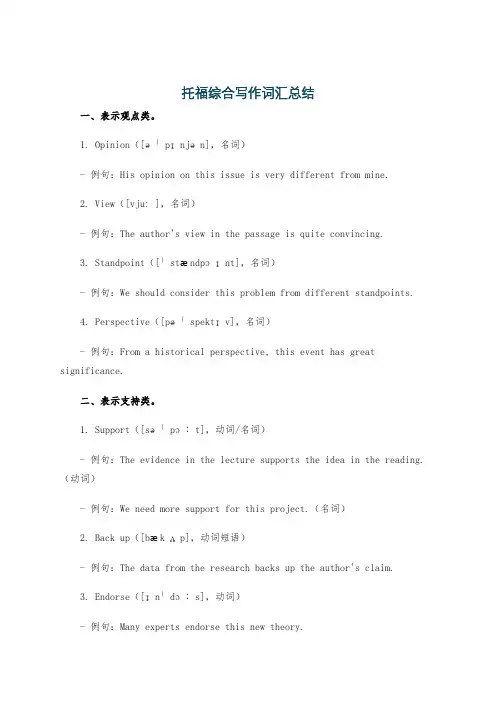
托福综合写作词汇总结一、表示观点类。
1. Opinion([əˈpɪnjən],名词)- 例句:His opinion on this issue is very different from mine.2. View([vjuː],名词)- 例句:The author's view in the passage is quite convincing.3. Standpoint([ˈstændpɔɪnt],名词)- 例句:We should consider this problem from different standpoints.4. Perspective([pəˈspektɪv],名词)- 例句:From a historical perspective, this event has great significance.二、表示支持类。
1. Support([səˈpɔːt],动词/名词)- 例句:The evidence in the lecture supports the idea in the reading.(动词)- 例句:We need more support for this project.(名词)2. Back up([bæk ʌp],动词短语)- 例句:The data from the research backs up the author's claim.3. Endorse([ɪnˈdɔːs],动词)- 例句:Many experts endorse this new theory.三、表示反对类。
1. Oppose([əˈpəʊz],动词)- 例句:Some people oppose the construction of the new factory.2. Object to([ˈɒbdʒɪkt tuː],动词短语)- 例句:He objects to the new policy.3. Contradict([ˌkɒntrəˈdɪkt],动词)- 例句:The lecturer's statement contradicts what is written in the reading.四、表示比较类。
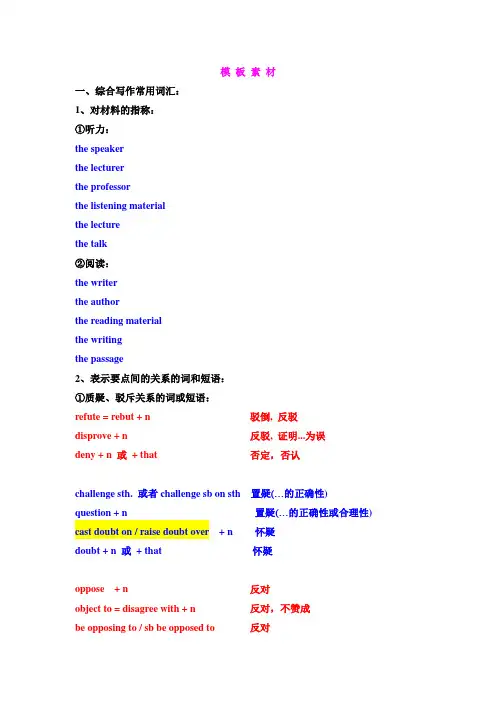
模板素材一、综合写作常用词汇:1、对材料的指称:①听力:the speakerthe lecturerthe professorthe listening materialthe lecturethe talk②阅读:the writerthe authorthe reading materialthe writingthe passage2、表示要点间的关系的词和短语:①质疑、驳斥关系的词或短语:refute = rebut + n 驳倒, 反驳disprove + n 反驳, 证明...为误deny + n 或+ that 否定,否认challenge sth. 或者challenge sb on sth 置疑(…的正确性) question + n 置疑(…的正确性或合理性) cast doubt on / raise doubt over + n 怀疑doubt + n 或+ that 怀疑oppose + n 反对object to = disagree with + n 反对,不赞成be opposing to / sb be opposed to 反对be against 反对be contrary 相反be opposite to 相反contradict + n 同...矛盾/抵触be contradictory to 同...矛盾/抵触conflict vi 抵触,有分歧A and B conflict 或者A conflict with Bbe conflicting to 抵触,有分歧differ from + n 与.. 不同②支持、强化关系的词或短语:support + n 支持back + n 支持enhance + n 增强,强化strengthen + n 加强uphold + n 支持,维护justify + n 为…辩护,证明…的是正当的3、陈述材料内容的词和短语:sayaccording to the lecture (reading passage) adv.state + that 说; 陈述remark + that 谈起,说make the point that + 从句take the position that + 从句propose + to do / + that 提议,主张maintain + that 主张,认为argue + that 争辩到, 认为indicate + that 表明,指出suggest + that 提出,表明mention + n 提及,说起note + n 或+ that 指出,说到claim + that 声称,断言assert + that 断言, 声称(formal)affirm + that 断言;肯定(formal)contend + that 声称,主张(formal)allege + that 宣称, 断言(formal)put forward + n 提出point out + that 指出conclude + that 断定4、表示转折关系的词和短语:①adv. in contrast / on the contrary / on the other hand/ however/ nevertheless/ nonetheless / in comparison②conj. while / whereas / although /yet/but5、表示转承的词和短语:①first, first of all, the first reason / point②second, furthermore, moreover, besides, what is more, in addition, another reason / point,additionally③third, finally, in the end6、其他有用的词汇:basis n. 根据grounds n. 理由,原因evidence n. 证据proof n. 证据groundless adj. 无根据的,无依据的unwarranted adj. 无根据的,不敢保证的incorrect adj. 不正确的improper adj. 不合适的,不恰当的inappropriate adj. 不合宜的,不适当的incomplete adj. 不完全的,不完整的exemplify + n 举例说明illustrate + n / + that 举例说明cast light on 使…显现given that… 考虑到in that …由于, 因为regarding prep. 关于concerning p rep. 关于with regard / respect to p rep. 关于in term(s) of …就…而言in light of…就…而言on the respect of …. 在…方面7. 因此As a resultAs a consequenceAccordinglyConsequentlyTherefore,Hence,Thus,Thereby二、综合写作黄金句型:1、首段(稍作转换亦可用于中间段)⏹The lecture…, which … the main idea in the reading that …⏹The professor … . On the contrary / in contrast / however, the writer … adifferent / contradictory / opposing idea that …⏹Contrary to / opposed to the belief / idea / point in the passage that …, theprofessor … that …⏹The professor … the viewpoint showed / suggested / indicated / mentioned /discussed / stated in the passage that … by saying that …⏹The evidence / proof / points / opinion given / provided / stated in the passageis groundless / unwarranted / somewhat inappropriate / inaccurate when compared to what is …ed in the lecture. The lecture …2、中间段⏹The professor made the point that … The reading, in contrast, held a …viewby saying that …⏹As regards to / in terms of …, the listening material …the readingmaterial. …⏹Another important point …in the reading material is that … but thelistening presents a conflicting / contradictory / opposing / negative / opposite idea that ….⏹The second / third point / reason / evidence …in the reading passage isthat… . Contrary to it is the professor’s …that …⏹Not as the passage puts it / Unlike … in the passage,, the lecturer ...⏹The passage …but it is not the case in the lecture. The professor …⏹The passage… while the lecture… . This was another part where (the … of)the lecture … (the … in ) the passage (that…).⏹Finally, the professor …. that … , which … t he standpoint made by thewriter who said that …三、综合写作句型集打造个性化模板模版范例:It is …ed in the lecture that…, which …the passage. According to the passage, …First, contrary to / opposite to / opposed to the …in the passage that…, the professor …that …The second … in the reading / by the author is that … however, the lecture .... This is another point / part where the lecture …the passage.Finally, the author of the passage …that …. Not as the passage puts it / Unlike … in the passage, the lecturer ...反驳关联套句1.This directly contradicts what the passage indicates.2.This is entirely oppose to the writer’s expectation.3.This is where the speaker disagrees with the writer.4.This was another part where experience contradicted theory.5.not as the passage puts it, ….6.Unlike described in the passage7.contrary to the passage, …/quite the contrary, …/quite the opposite,…/just the opposite, …/ by contraries, …/on the contrary, …/to the contrary, …8.while/whereas the writer states…., the lecturer opposes the claim9.actually/in fact/in deed10.The fact is …/the point is…/it turns out that…指代文章信息的抽象名词:1.reason cause basis ground motive motivation2.example instance3.evidence date fact proof basis foundation4.explanation account5.definition description clarification6.assumption premise hypothesis guess7.conclusion belidf idea opinion judgment view notion argument theo ry8.issue matter topic problem subject concern9.acknowledgement observation10.statement point detail11.advice appeal proposal plan scheme recommendation12.benefit advantage improvement指代讲座信息的抽象名词1.studies researches2.finding discovery3.alternative explanation theory4.counter-example counter-evidence5.claim assertion6.objection refutation charge7.remark comment。
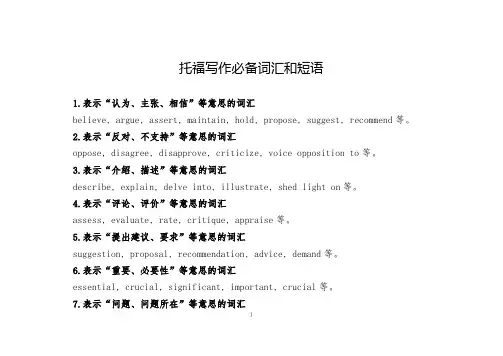
托福写作必备词汇和短语1.表示“认为、主张、相信”等意思的词汇believe, argue, assert, maintain, hold, propose, suggest, recommend等。
2.表示“反对、不支持”等意思的词汇oppose, disagree, disapprove, criticize, voice opposition to等。
3.表示“介绍、描述”等意思的词汇describe, explain, delve into, illustrate, shed light on等。
4.表示“评论、评价”等意思的词汇assess, evaluate, rate, critique, appraise等。
5.表示“提出建议、要求”等意思的词汇suggestion, proposal, recommendation, advice, demand等。
6.表示“重要、必要性”等意思的词汇essential, crucial, significant, important, crucial等。
7.表示“问题、问题所在”等意思的词汇1issue, problem, question, difficulty, challenge等。
8.表示“优点、好处”等意思的词汇benefit, advantage, positive aspect, upside等。
9.表示“缺点、不利之处”等意思的词汇drawback, disadvantage, downside等。
10.表示“举例”等意思的词汇for example, for instance, such as等。
11.表示“总结”等意思的词汇summary, conclusion, bottom line等。
12.表示“改变、变化”等意思的词汇change, transformation, shift等。
当然,除了上述所列举的词汇和短语外,还有许多其他的常用词汇和短语,考生可以根据自己的实际情况进行总结和积累。
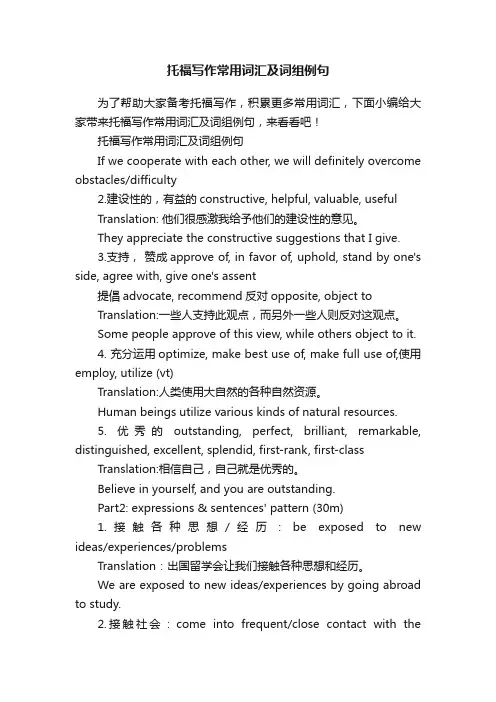
托福写作常用词汇及词组例句为了帮助大家备考托福写作,积累更多常用词汇,下面小编给大家带来托福写作常用词汇及词组例句,来看看吧!托福写作常用词汇及词组例句If we cooperate with each other, we will definitely overcome obstacles/difficulty2.建设性的,有益的constructive, helpful, valuable, usefulTranslation: 他们很感激我给予他们的建设性的意见。
They appreciate the constructive suggestions that I give.3.支持,赞成approve of, in favor of, uphold, stand by one's side, agree with, give one's assent提倡advocate, recommend反对opposite, object toTranslation:一些人支持此观点,而另外一些人则反对这观点。
Some people approve of this view, while others object to it.4. 充分运用optimize, make best use of, make full use of,使用employ, utilize (vt)Translation:人类使用大自然的各种自然资源。
Human beings utilize various kinds of natural resources.5. 优秀的outstanding, perfect, brilliant, remarkable, distinguished, excellent, splendid, first-rank, first-class Translation:相信自己,自己就是优秀的。
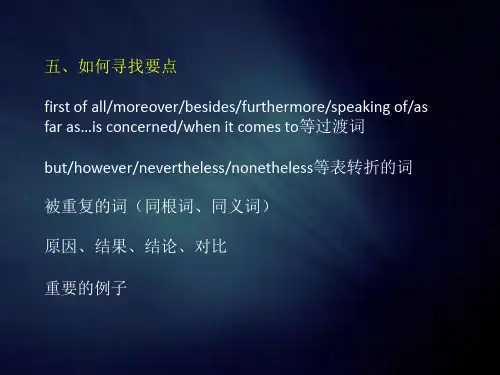
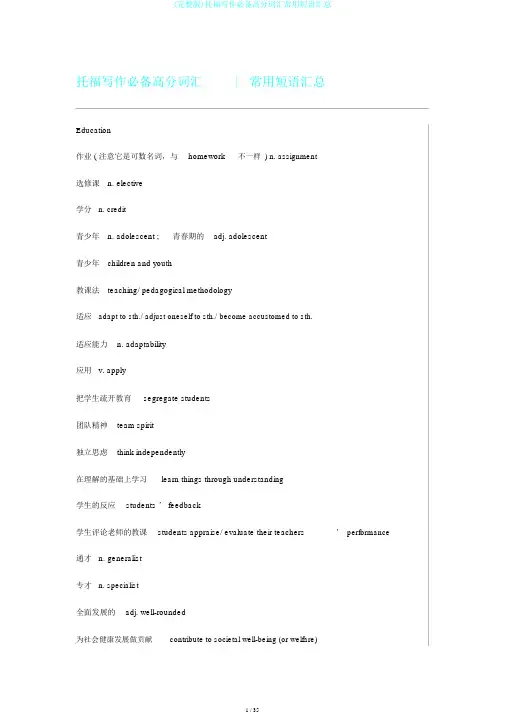
托福写作必备高分词汇| 常用短语汇总Education作业 ( 注意它是可数名词,与homework不一样) n. assignment选修课n. elective学分n. credit青少年n. adolescent ;青春期的adj. adolescent青少年children and youth教课法teaching/ pedagogical methodology适应adapt to sth./ adjust oneself to sth./ become accustomed to sth.适应能力n. adaptability应用v. apply把学生疏开教育segregate students团队精神team spirit独立思虑think independently在理解的基础上学习learn things through understanding学生的反应students ’ feedback学生评论老师的教课students appraise/ evaluate their teachers’ performance 通才n. generalist专才n. specialist全面发展的adj. well-rounded为社会健康发展做贡献contribute to societal well-being (or welfare)人文学科n. humanities社会科学social sciences艺术n. arts文科总称n. liberal studies/ arts理科n. sciences工科n. engineering基础科学basic sciences应用科学applied sciences学科 ( 通称 ); 纪律n. discipline管教vt. discipline自制力n. self-discipline小( 中、大 ) 学教育 primary-level (or secondary-level/ tertiary-level ) education 职业教育vocational education/ training互动vt. interact学校给学生的教育n. schooling学校供给的课程总称n. curriculum ( pl. curricula)心理的adj. psychological参加n. participation≈ involvement扰乱n. distraction记忆vt. memorize获得vt. acquire以教师为中心的adj. teacher-centered以学生为中心的adj. student- centered熟掌握⋯⋯ be proficient in榜role model同人n. peer孩子或许其余弱者度保adj. overprotective力n. motivation沮n. frustration家小孩的教育n. parenting用批评的目光去看的能力critical thinking abilities ( 某方面的 ) 意n. awareness (of)有造力的adj. creative / original⋯⋯特别熟习adj. well-acquainted (with)表优异perform well⋯⋯打好基lay a solid foundation for自尊n. self-esteem尊n. dignity估n. evaluation⋯⋯特别好的掌握n. mastery好奇心 n. curiosity精英n. elite教育test-oriented education富于想象力的imaginative沉浸于⋯⋯ indulge in⋯发人沉思的adj. thought- provoking无知的adj. ignorant文盲 ( 的) n.&adj. illiterate学龄前小孩或许上学前班的小孩n. preschooler对文字技术的掌握对数学知识的掌握误入歧路go astray n. literacy n. numeracy给人新鲜感的adj. refreshing令人振奋的adj. uplifting给人动力的adj. motivating单亲家庭n. single-parent family未成年人n. minors宠爱vt. spoil青少年犯法juvenile delinquency/ youth crime欺凌 ( 当名词是“喜爱欺凌人的孩子”的意思) vt.& n. bully逃学n. truancy很有启示的adj. enlightening成型的阶段formative years植物学n. botany天文学n. astronomy培育v. cultivate/ foster/ nurture促使学生身心发展promote the student’s physical/ mental (or intellectual) andemotional development心理健康psychological soundness/ well-being/ welfare给学生以动力give the students motivation to do sth./ motivate the students todo sth.教授知识impart/ inculcate knowledge灌注崇高的道德观instill high moral values给学生以灵感give the students inspiration学生对老师所教知识的掌握students ’ grasp (or command) of what has beentaught就业技术employable ( or marketable) skills填鸭式教法教课生force-feed the students学生不该当不过被动接受知识的容器。
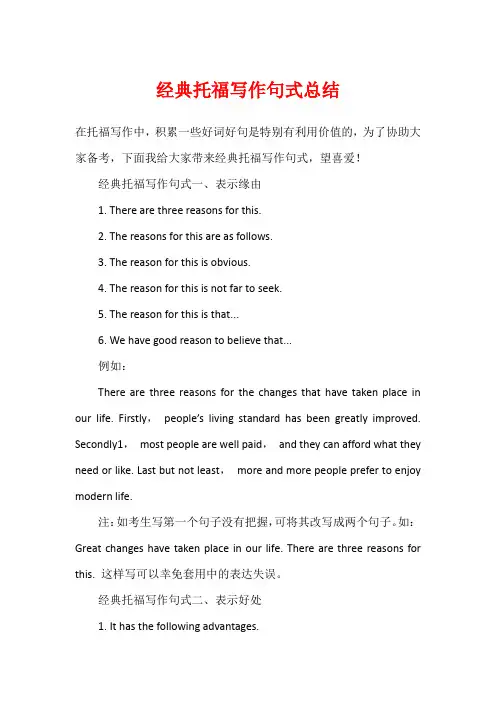
经典托福写作句式总结在托福写作中,积累一些好词好句是特别有利用价值的,为了协助大家备考,下面我给大家带来经典托福写作句式,望喜爱!经典托福写作句式一、表示缘由1. There are three reasons for this.2. The reasons for this are as follows.3. The reason for this is obvious.4. The reason for this is not far to seek.5. The reason for this is that...6. We have good reason to believe that...例如:There are three reasons for the changes that have taken place in our life. Firstly,people’s living standard has been greatly improved. Secondly1,most people are well paid,and they can afford what they need or like. Last but not least,more and more people prefer to enjoy modern life.注:如考生写第一个句子没有把握,可将其改写成两个句子。
如:Great changes have taken place in our life. There are three reasons for this. 这样写可以幸免套用中的表达失误。
经典托福写作句式二、表示好处1. It has the following advantages.2. It does us a lot of good.3. It benefits us quite a lot.4. It is beneficial to us.5. It is of great benefit to us.例如:Books are like friends. They can help us know the world better,and they can open our minds and widen2 our horizons. Therefore,reading extensively3 is of great benefit to us.经典托福写作句式三、表示害处1. It has more disadvantages than advantages.2. It does us much harm.3. It is harmful to us.例如:However,everything divides into two. Television can also be harmful to us. It can do harm to our health and make us lazy if we spend too much time watching television.经典托福写作句式四、表示重要. 必要. 困难. 便利. 可能1. It is important(necessary,difficult,convenient,possible. for sb. to do sth.2. We think it necessary to do sth.3. It plays an important role in our life.例如:Computers are now being used everywhere,whether in the government,in schools or in business. Soon,computers will be found in every home,too. We have good reason to say that computers are playing an increasingly4 important role in our life and we have stepped into the Computer Age.经典托福写作句式五、表示措施1. We should take some effective measures.2. We should try our best to overcome (conquer. the difficulties.3. We should do our utmost5 in doing sth.4. We should solve the problems that we are confronted6(faced. with.例如:The housing7 problem that we are confronted with is becoming more and more serious. Therefore,we must take some effective measures to solve it.经典托福写作句式六、表示改变1. Some changes have taken place in the past five years.2. A great change will certainly be produced in the world’s communications.3. The computer has brought about many changes in education.例如:Some changes have taken place in people’s diet in the past fiveyears. The major reasons for these changes are not far to seek. Nowadays,more and more people are switching from grain to meat for protein,and from fruit and vegetable to milk for vitamins.经典托福写作句式七、表示事实. 现状1. We cannot ignore the fact that...2. No one can deny the fact that...3. There is no denying the fact that...4. This is a phenomenon that many people are interested in.5. However,that’s not the case.例如:We cannot ignore the fact that industrialization8 brings with it the problems of pollution. To solve these problems,we can start by educating the public about the hazards9 of pollution. The government on its part should also design stricter laws to promote a cleaner environment.经典托福写作句式总结。
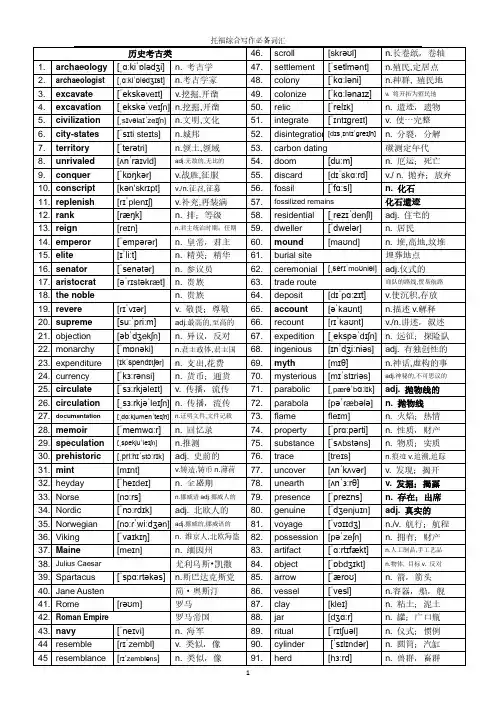
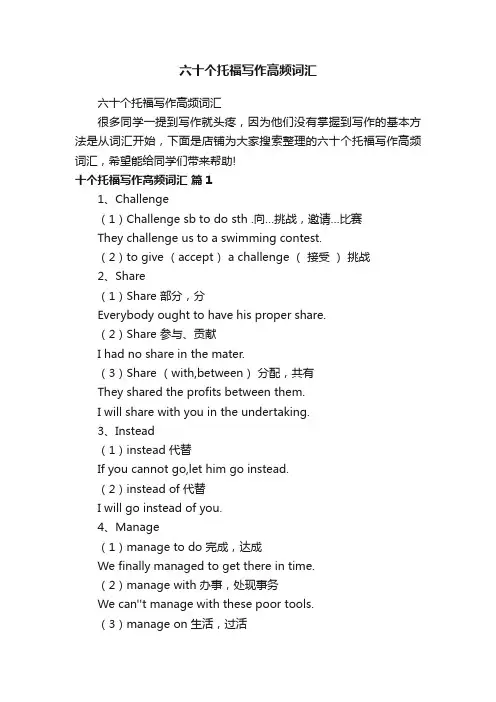
六十个托福写作高频词汇六十个托福写作高频词汇很多同学一提到写作就头疼,因为他们没有掌握到写作的基本方法是从词汇开始,下面是店铺为大家搜索整理的六十个托福写作高频词汇,希望能给同学们带来帮助!十个托福写作高频词汇篇11、Challenge(1)Challenge sb to do sth .向…挑战,邀请…比赛They challenge us to a swimming contest.(2)to give (accept) a challenge (接受)挑战2、Share(1)Share 部分,分Everybody ought to have his proper share.(2)Share 参与、贡献I had no share in the mater.(3)Share (with,between)分配,共有They shared the profits between them.I will share with you in the undertaking.3、Instead(1)instead 代替If you cannot go,let him go instead.(2)instead of 代替I will go instead of you.4、Manage(1)manage to do 完成,达成We finally managed to get there in time.(2)manage with 办事,处现事务We can''t manage with these poor tools.(3)manage on 生活,过活How will she manage with her husband gone. 5、Afford(1)afford to do 足以承担I cannot afford to pay such a high price.(2)afford 产生Reading affords pleasure.6、Rather(1)would rather do 宁愿He said he would rather stay at home.(2)rather than 宁愿I had rather dance than eat.7、Ever(1)ever 曾经Have you ever been there?(2)ever 究竟Why ever didn''t you go.(3)ever 如果If the band(乐队)ever plays again,we will dance. (4)ever so=veryThank you ever so much.8、Available(1) available 通用的,有效的The season ticket is available for three months. (2)available 可用的,可达到的9、Else(1)else 此外,别的Where else did you go?(2)else 否则,不然Hurry,else you''ll be late.10、Involve(1)involve 包括Housekeeping involves cooking, washing dishes, sweeping and cleaning.(2)involve 使陷于One foolish mistake can involve you in a good deal of trouble.(3)involve 使纠缠,使难得A sentence that is involved is hard to understand.(4)involve 包围Clouds involved the hilltop.十个托福写作高频词汇篇21. concept ['knsept] n.概念2. conclude [kn'klu:d] v.结束;下结论3. concurrent [kn'krnt] a.同时发生的;并存的4. conduct ['kndkt, kn'dkt] n.行为 v.实施;指挥;导电5. confer [kn'f:] v.授予;协商6. confine [kn'fain, 'knfain] v.限制;禁闭7. confirm [kn'f:m] v.证实8. conflict [kn'flikt, 'knflikt] n.冲突 v.冲突9. conform [kn'f:m] v.遵守;符合10. consent [kn'sent] n.&v.同意十个托福写作高频词汇篇31. consequent ['knsi,kwnt] a.作为结果的2. considerable [kn'sidrbl] a.相当的3. consist [kn'sist] v.由…组成4. constant ['knstnt] a.不断的.5. constitute ['knstitju:t] v.构成6. constrain [kn'strein] v.限制;强制7. construct [kn'strkt] v.建造8. consult [kn'slt, 'knslt] v.商量;咨询;查阅9. consume [kn'sju:m] v.消耗;消费10. contact ['kntkt, kn'tkt] v.&n.接触;联系十个托福写作高频词汇篇41. contemporary [kn'temprri] a.当代的 n.同代人2. context ['kntekst] n.上下文;背景3. contract ['kntrkt, kn'trkt] n.合同 v.收缩4. contradict [,kntr'dikt] v.反驳;与…矛盾5. contrary ['kntrri] a.&n.相反6. contrast [kn'trɑ:st, -'trst, 'kntrɑ:st, -trst] n.对比 v.形成对比7. contribute [kn'tribju:t] v.捐献;贡献;投稿8. controversy ['kntr,v:si] n.争论9. convene [kn'vi:n] v.召集10. converse [kn'v:s] a.相反的十个托福写作高频词汇篇51. convert [kn'v:t] v.转化2. convince [kn'vins] v.使确信3. cooperate [ku'preit] v.合作4. coordinate [ku':dinit, ku':dineit] a.同等的 v.使协调5. core [k:] n.核心6. corporate ['k:prit] a.公司的7. correspond [,k:ri'spnd] v.通信;符合;对应8. couple ['kpl] n.两个;夫妇9. create [kri'eit] v.创造;引起10. credit ['kredit] n.信用;学分;功劳十个托福写作高频词汇篇61. criterion [krai'tirin] n.标准2. crucial ['kru:l] a.决定性的3. culture ['klt] n.文化;修养4. currency ['krnsi] n.货币5. cycle ['saikl] n.循环;周期6. data ['deit] n.[复]数据7. debate [di'beit] n.&v.辩论8. decade ['dekeid] n.十年9. decline [di'klain] v.谢绝;下倾;衰退 n.衰退10. deduce [di'dju:s] v.演绎。
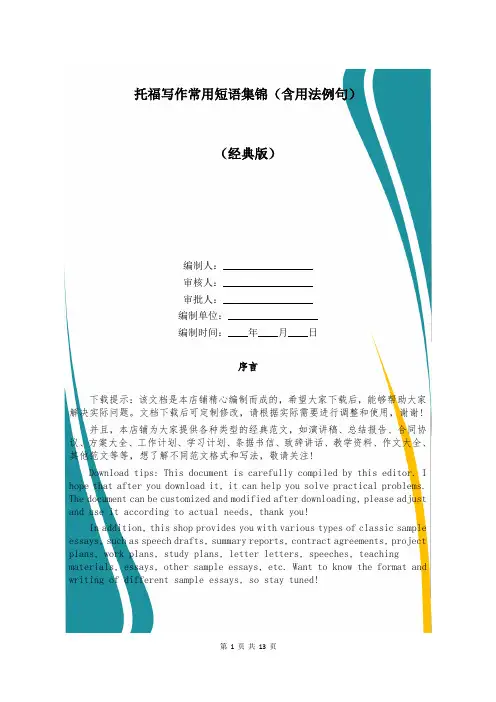
托福写作常用短语集锦(含用法例句)(经典版)编制人:__________________审核人:__________________审批人:__________________编制单位:__________________编制时间:____年____月____日序言下载提示:该文档是本店铺精心编制而成的,希望大家下载后,能够帮助大家解决实际问题。
文档下载后可定制修改,请根据实际需要进行调整和使用,谢谢!并且,本店铺为大家提供各种类型的经典范文,如演讲稿、总结报告、合同协议、方案大全、工作计划、学习计划、条据书信、致辞讲话、教学资料、作文大全、其他范文等等,想了解不同范文格式和写法,敬请关注!Download tips: This document is carefully compiled by this editor. I hope that after you download it, it can help you solve practical problems. The document can be customized and modified after downloading, please adjust and use it according to actual needs, thank you!In addition, this shop provides you with various types of classic sample essays, such as speech drafts, summary reports, contract agreements, project plans, work plans, study plans, letter letters, speeches, teaching materials, essays, other sample essays, etc. Want to know the format and writing of different sample essays, so stay tuned!托福写作常用短语集锦(含用法例句)为了帮助大家写好托福写作,积累更多词汇,下面本店铺给大家带来托福写作常用短语集锦(含用法例句,来学习一下吧1 托福写作常用短语集锦1General Explaining 解释Let’s start by looking at language for general explanations of complex points. 【解释】1. In order toUsage: “In order to”can be used to introduce an explanation for the purpose of an argument.Example: “In order to understand X, we need first to understand Y.”2. In other wordsUsage: Use “in other words” when you want to express something in a different way (more simply), to make it easier to understand, or to emphasise or expand on a point.Example: “Frogs are amphibians. In other words, they live on the land and in the water.”3. To put it another wayUsage:This phrase is another way of saying “in other words”, and can be used in particularly complex points, when you feel that an alternative way of wording a problem may help the readerachieve a better understanding of its significance.Example: “Plants rely on photosynthesis. To put it another way, they will die without the sun.”4. That is to sayUsage:“That is” and “that is to say” can be used to add further detail to your explanation, or to be more precise.Example:“Whales are mammals. That is to say, they must breathe air.”5. To that endUsage: Use “to that end” or “to this end” in a similar way to “in order to” or “so”.Example: “Zoologists have long sought to understand how animals communicate with each other. To that end, a new study has been launched that looks at elephant sounds and their possible meanings.”Adding additional information to support a point 并列Students often make the mistake of using synonyms of “and”each time they want to add further information in support of a point they’re making, or to build an argument. Here are some cleverer ways of doing this. 【衔接两个点的时候,不要总是用and】6. MoreoverUsage: Employ “moreover” at the start of a sentence to add extra information in supportof a point you’re making.Example: “Moreover, the results of a recent piece of research provide compelling evidence in support of…”7. FurthermoreUsage: This is also generally used at the start of a sentence, to add extra information.Example:“Furthermore, there is evidence to suggest that…”8. What’s moreUsage:This is used in the same way as “moreover” and “furthermore”.Example: “What’s more, this isn’t the only evidence that supports this hypothesis.”9. LikewiseUsage:Use “likewise” when you want to talk about something that agrees with what you’ve just mentioned.Example:“Scholar A believes X. Likewise, Scholar B argues compellingly in favour of this point of view.”10. SimilarlyUsage: Use “similarly” in the same way as “likewise”.Example:“Audiences at the time reacted with shock to Beethoven’s new work, because it was very different to whatthey were used to. Similarly, we have a tendency to react with surprise to the unfamiliar.”托福写作常用短语集锦211. Another key thing to rememberUsage:Use the phrase “another key point to remember” or “another key fact to remember” to introduce additional facts without using the word “also”.Example:“As a Romantic, Blake was a proponent of a closer relationship between humans and nature. Another key point to remember is that Blake was writing during the Industrial Revolution, which had a major impact on the world around him.”12. As well asUsage: Use “as well as” instead of “also” or “and”.Example:“Scholar A argued that this was due to X, as well as Y.”13. Not only… but alsoUsage: This wording is used to add an extra piece of information, often something that’s in some way more surprising or unexpected than the first piece of information.Example:“Not only did Edmund Hillary have the honour of being the first to reach the summit of Everest, but he was also appointed Knight Commander of the Order of the British Empire.”14. Coupled withUsage:Used when considering two or more arguments at a time.Example: “Coupled with the literary evidence, the statistics paint a compelling view of…”15. Firstly, secondly, thirdly…Usage: This can be used to structure an argument, presenting facts clearly one after the other.Example: “There are many points in support of this view. Firstly, X. Secondly, Y. And thirdly, Z.16. Not to mention/to say nothing ofUsage: “Not to mention” and “to say nothing of” can be used to add extra information with a bit of emphasis.Example:“The war caused unprecedented suffering to millions of people, not to mention its impact on the country’s economy.”Words and phrases for demonstrating contrast 对比When you’re developing an argument, you will often need to present contrasting or opposing opinions or evidence –“it could show this, but it could also show this”, or “X says this, but Y disagrees”. This section covers words you can use instead of the “but” in these examples, to make your writing sound more intelligent and interesting.【表对比】17. HoweverUsage: Use “however” to introduce a point that disagrees with what you’ve just said.Example: “Scholar A thinks this. However, Scholar B reached a different conclusion.”18. On the other handUsage: Usage of this phrase includes introducing a contrasting interpretation of the same piece of evidence, a different piece of evidence that suggests something else, or an opposing opinion.Example: “The historical evidence appears to suggest a clear-cut situation. On the other hand, the archaeological evidence presents a somewhat less straightforward picture of what happened that day.”19. Having said thatUsage:Used in a similar manner to “on the other hand” or “but”.Example:“The historians are unanimous in telling us X, an agreement that suggests that this version of events must be an accurate account. Having said that, the archaeology tells a different story.”20. By contrast/in comparisonUsage:Use “by contrast” or “in comparison” when you’re comparing and contrasting pieces of evidence.Example: “Scholar A’s opinion, then, is based on insufficient evidence. By contrast, Scholar B’s opinion seems more plausible.”托福写作常用短语集锦321. Then againUsage: Use this to cast doubt on an assertion.Example:“Writer A asserts that this was the reason for what happened. Then again, it’s possible that he was being paid to say this.”22. That saidUsage: This is used in the same way as “then again”.Example: “The evidence ostensibly appears to point to this conclusion. That said, much of the evidence is unreliable at best.”23. YetUsage:Use this when you want to introduce a contrasting idea.Example:“Much of scholarship has focused on this evidence. Yet not everyone agrees that this is the most important aspect of the situation.”Adding a proviso or acknowledging reservations 让步Sometimes, you may need to acknowledge a shortfalling in a piece of evidence, or add a proviso. Here are some ways of doing so.【让步】24. Despite thisUsage:Use “despite this” or “in spite of this” when you want to outline a point that stands regardless of a shortfalling in the evidence.Example:“The sample size was small, but the results were important despite this.”25. With this in mindUsage: Use this when you want your reader to consider a point in the knowledge of something else.Example:“We’ve seen that the methods used in the 19th century study did not always live up to the rigorous standards expected in scientific research today, which makes it difficult to draw definite conclusions. With this in mind, let’s look at a more recent study to see how the results compare.”26. Provided thatUsage:This means “on condition that”. You can also say “providing that” or just “providing” to mean the same thing.Example:“We may use this as evidence to support ourargument, provided that we bear in mind the limitations of the methods used to obtain it.”27. In view of/in light ofUsage: These phrases are used when something has shed light on something else.Example: “In light of the evidence from the 20XX study, we have a better understanding of…”28. NonethelessUsage:This is similar to “despite this”.Example:“The study had its limitations, but it was nonetheless groundbreaking for its day.”29. NeverthelessUsage:This is the same as “nonetheless”.Example: “The study was flawed, but it was important nevertheless.”30. NotwithstandingUsage: This is another way of saying “nonetheless”.Example:“Notwithstanding the limitations of the methodology used, it was an important study in the development of how we view the workings of the human mind.”Giving examples 举例Good essays always back up points with examples, but it’s going to get boring if you use the expression “for example”every time. Here are a couple of other ways of saying the same thing.【好作文,必举例!】托福写作常用短语集锦431. For instance/ For exampleExample: “Some birds migrate to avoid harsher winter climates. Swallows, for instance, leave the UK in early winter and fly south…”32. To give an illustrationExample:“To give an illustration of what I mean, let’s look at the case of…”Signifying importance 强调When you want to demonstrate that a point is particularly important, there are several ways of highlighting it as such.【强调重要性】33. SignificantlyUsage:Used to introduce a point that is loaded with meaning that might not be immediately apparent.Example: “Significantly, Tacitus omits to tell us the kind of gossip prevalent in Suetonius’ accounts of the same period.”34. NotablyUsage:This can be used to mean “significantly” (as above),and it can also be used interchangeably with “in particular”(the example below demonstrates the first of these ways of using it).Example: “Actual figures are notably absent from Scholar A’s analysis.”35. ImportantlyUsage: Use “importantly”interchangeably with “significantly”.Example: “Importantly, Scholar A was being employed by X when he wrote this work, and was presumably therefore under pressure to portray the situation more favourably than he perhapsSummarising 总结You’ve almost made it to the end of the essay, but your work isn’t over yet. You need to end by wrapping up everything you’ve talked about, showing that you’ve considered the arguments on both sides and reached the most likely conclusion. Here are some words and phrases to help you.【总结】36. In conclusionUsage: Typically used to introduce the concluding paragraph or sentence of an essay, summarising what you’ve discussed in a broad overview.Example:“In conclusion, the evidence points almost exclusively to Argument A.”37. Above allUsage:Used to signify what you believe to be the most significant point, and the main takeaway from the essay.Example: “Above all, it seems pertinent to remember that…”38. PersuasiveUsage:This is a useful word to use when summarising which argument you find most convincing.Example: “Scholar A’s point – that Constanze Mozart was motivated by financial gain – seems to me to be the most persuasive argument for her actions following Mozart’s death.”39. CompellingUsage: Use in the same way as “persuasive” above.Example: “The most compelling argument is presented by Scholar A.”40. All things consideredUsage:This means “taking everything into account”.Example: “All things considered, it seems reasonable to assume that…”托福写作常用短语集锦(含用法例句)终于写完毕了,希望能够帮助到大家,谢谢!。
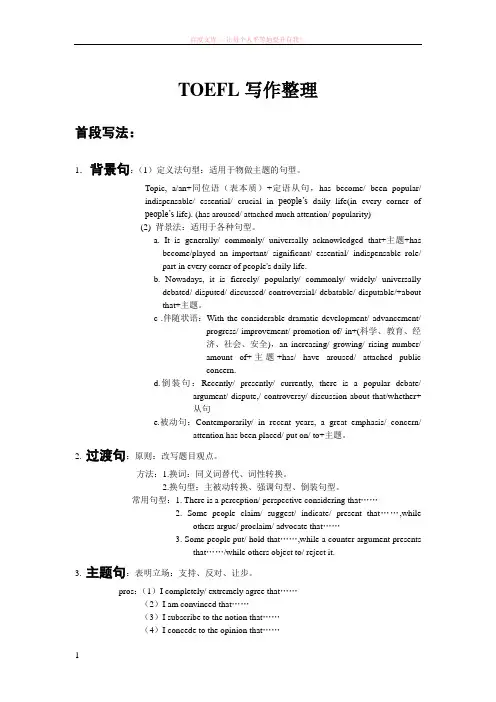
TOEFL写作整理首段写法:1.背景句:(1)定义法句型:适用于物做主题的句型。
Topic, a/an+同位语(表本质)+定语从句,has become/ been popular/indispensable/ essential/ crucial in people’s daily life(in every corner ofpeople’s life). (has aroused/ attached much attention/ popularity)(2) 背景法:适用于各种句型。
a. It is generally/ commonly/ universally acknowledged that+主题+hasbecome/played an important/ significant/ essential/ indispensable role/part in every corner of people's daily life.b. Nowadays, it is fiercely/ popularly/ commonly/ widely/ universallydebated/ disputed/ discussed/ controversial/ debatable/ disputable/+aboutthat+主题。
c .伴随状语:With the considerable dramatic development/ advancement/progress/ improvement/ promotion of/ in+(科学、教育、经济、社会、安全),an increasing/ growing/ rising number/amount of+主题+has/ have aroused/ attached publicconcern.d.倒装句:Recently/ presently/ currently, there is a popular debate/argument/ dispute,/ controversy/ discussion about that/whether+从句e.被动句:Contemporarily/ in recent years, a great emphasis/ concern/attention has been placed/ put on/ to+主题。
托福综合写作模板总结及词汇总结多样化表达:阅读:The reading, the passage, the author, the article听力:The listening, the lecture, the lecturer, the professor, the speaker认为:believe, hold, suggest, support, point out, advocate(提倡,主张,通常不用于反对意见), claim反驳:Criticize vt. 批评criticism n. (crisis n. 危机)Argue, challenge, doubt, disagree, refute,…. Is questionable.但是:However, although, on the other hand, in contrast, while,增加:Increase(n&vt), boost ( boost the economy )(n&vt使增长;推动;改进;使兴旺), maximize/maximization, add to sth (global warming)Improve/improvement, enhance/enhancement, heightenfortify/fortification(vt使强化,使振作), advance(vi&vt&n)expansion(used in size, number, amount), amplify(扩大声音、增强,加剧), enlarge (及物&不及物,扩大;~on sth 进一步说明,详述)thrive降低:Decline(vi&n), decrease, minimize/minimization, reduce/reduction, cut down, shrink(vi&vt)/shrinkageDamage, impair(vt, 损害,削弱), cause damage to, harm, hurtDestroy, destruction, do great damage to, do harm to, ruin, catastrophic damage,the disastrous consequence,endanger(vt危及,危害)影响:aftermath 后果,余波the ~ of (an important event)affect副词:definitely ,totally(disagree with),strongly(influenced by)其他:Utility 用途Alternative/ substitute:an alternative to sth 某事物的替代品;alternative sth 备用,可替代sthsb substitute one thing for another/ one thing substitute for another 取代,替换a substitute for sth 替代品生物生态类:物种数量骤降/骤增分析原因:假说分析Hypothesis, explanation, cause, theoryPredator, predation, pollution, climate change, habitat, insect, human actionat long-term environmental expense(It exposes the fallacy of short-term industrial gain at long-term environmental expense这暴露了以长久的环境破坏为代价换取短期工业利益的错误。
托福写作必备高分词汇常用短语汇总托福写作中的高分词汇和常用短语可以分为以下几个主题:1.归纳总结类:- In summary 总之- In conclusion 结论是- On the whole 总体来说- To sum up 总结起来- In essence 本质上- All in all 总而言之- In brief 简而言之- Ultimately 最终地- In a nutshell 简而言之- In other words 换句话说2.论证类:- Moreover 此外- Furthermore 此外- Additionally 此外- Besides 此外- What's more 更重要的是- Above all 最重要的是- not only...but also 不仅...而且...- For instance 例如- For example 例如- To illustrate 举例来说- In particular 尤其是- That is to say 换句话来说3.相反转折类:- However 然而- Nevertheless 然而- Nonetheless 然而- In contrast 相反地- On the contrary 相反地- Despite 尽管如此- Although 虽然- Even though 即使- On the one hand...on the other hand 一方面...另一方面- Instead of 代替- Rather than 而不是4.增强强调类:- Indeed 确实- Certainly 当然- Undoubtedly 无疑地- Absolutely 绝对地- Clearly 显然地- Surely 肯定地- Obviously 显然地- Definitely 肯定地- Without a doubt 毫无疑问地- Without question 毫无问题地5.时间顺序类:- First 首先- Second 其次- Next 接着- Then 然后- Finally 最后- Eventually 最终地- Meanwhile 与此同时- Before 在...之前- After 在...之后- While 在...期间- During 在...过程中希望这些词汇和短语能够对你在托福写作中有所帮助!。
托福综合写作常用词语及句型给在准备托福考试的同学分享一些干货托福综合写作常用词语及句型1. 常用词语提示逻辑顺序:First of all, First, to start with, Second, Also, Besides, Furthermore, Moreover, Another, in addition to, Finally, Lastly, Third阅读文章指代:The reading passage, the writer, the author, writer of the reading, the reading material听力材料指代:Professor, lecturer, speaker, instructor, presenter, lecture, speech, talk, the listening, the presentation 表转折类关系词语:However, but, yet, even so, despite that, even though, although, while, whereas反驳类词语:contradicts, challenges, clashes with, conflicts with, denies, opposes, runs counter to, raises doubts about, throws …into doubt, in opposition to, in stark contrast to, in spite of, questions, cast doubt on, disagree with,研究类词语:explore, analyzes, examines, deals with, is concerned with, is about, focuses on, concentrates on, investigates(深入研究)讨论类词语:think,believes, argues, asserts, claims, contends, insists, states, indicates, discusses, raise the issue that,支持类词语:Support, confirm, back up, strengthen, bolster, advocate, reinforce观点类:Idea, view, opinion, viewpoint话题类:Issue, subject, topic证明:Proves, shows, confirms, verifies对比:Contrary to, in opposition to, in stark contrast to, in spite of2. 写作常用句型开头段1. The lecture revises the idea presented in the text that______.2. The professor actually contradicts the statement made in the passage. She is the view that ______.3. The author of the reading passage proposes _____. The lecturer, however, points to the inaccuracies in _____.(Casting-Doubt)4. The lecture and the reading passage give contradictory opinions on the topic of ________. The reading passage explains that______ while the lecture provides several counterarguments to this view.5. The reading passage raises several doubts about _____, whereas the professor defends _____. (Casting-Doubt)6. The lecturer points out several problems with ______ in support of her claim that ________. (Casting-Doubt)7. The lecturer rejects the ideas presented in the reading passage about ______. In her opinion, _______.8. The lecturer and the reading passage hold completely different views toward ________, which is ________.9. The professor explains three aspects of _______, each of which has successfully addressed the problems mentioned in the reading passage (concerning _____, ______ and _______). (Problem-Solution)10. The reading passage argues that _________. However, the professor raises serious counterarguments against the reading by providing three aspects as listed below.主体段1. ____ dissolves as the professor explains that _______. (Problem-Solution)2. ____ is also solved in the lecture. (Problem-Solution)3. ____ is refuted by the fact that _____.4. ____ contradicts the issue of _____. She says that _____.5. The issue of ______ does not please the professor either. She says that ____.6. The professor acknowledge/admit ____, but also points out that ____. (存在承认、让步)7. The lecturer argues that _____. The reading, however,______.8. The first/second theory, that ________ is (also) rejected by the lecturer. He explains that _______.9. Regarding the ______, the lecturer contends that _____. He argues that ______.10. The lecturer challenges the first/second/final point in the reading regarding the _______. She says that ________.11. According to the professor, ________. According to the reading, however, _______.12. The reading argues that ________. The reading, however, holds that _______.13. The professor rejects the claim in the reading that_______. She says that _______.14. Although the reading suggests that _______, the professor argues that _________.15. The lecturer does not agree with the first/second/final point made in the reading --- that ______. She contends that _______.16. The lecturer states that ______. In contrast, the reading passage states that _______.17. According to the speaker, ________. This point directly contradicts what the passage indicates.18. The reading passage states that _______. The professor, however, states that _______.19. The professor opposes the reading passage by pointing out _______. The professor counters the claim made by the reading passage.20. The professor doubts _______. On the contrary to the reading passage, he/she points out that _______.扫描二维码限时获取免费视频课程。
托福综合写作常用词语及句型给在准备托福考试的同学分享一些干货托福综合写作常用词语及句型1. 常用词语提示逻辑顺序:First of all, First, to start with, Second, Also, Besides, Furthermore, Moreover, Another, in addition to, Finally, Lastly, Third阅读文章指代:The reading passage, the writer, the author, writer of the reading, the reading material听力材料指代:Professor, lecturer, speaker, instructor, presenter, lecture, speech, talk, the listening, the presentation 表转折类关系词语:However, but, yet, even so, despite that, even though, although, while, whereas反驳类词语:contradicts, challenges, clashes with, conflicts with, denies, opposes, runs counter to, raises doubts about, throws …into doubt, in opposition to, in stark contrast to, in spite of, questions, cast doubt on, disagree with,研究类词语:explore, analyzes, examines, deals with, is concerned with, is about, focuses on, concentrates on, investigates(深入研究)讨论类词语:think,believes, argues, asserts, claims, contends, insists, states, indicates, discusses, raise the issue that,支持类词语:Support, confirm, back up, strengthen, bolster, advocate, reinforce观点类:Idea, view, opinion, viewpoint话题类:Issue, subject, topic证明:Proves, shows, confirms, verifies对比:Contrary to, in opposition to, in stark contrast to, in spite of2. 写作常用句型开头段1. The lecture revises the idea presented in the text that______.2. The professor actually contradicts the statement made in the passage. She is the view that ______.3. The author of the reading passage proposes _____. The lecturer, however, points to the inaccuracies in _____.(Casting-Doubt)4. The lecture and the reading passage give contradictory opinions on the topic of ________. The reading passage explains that ______ while the lecture provides several counterarguments to this view.5. The reading passage raises several doubts about _____, whereas the professor defends _____. (Casting-Doubt)6. The lecturer points out several problems with ______ in support of her claim that ________. (Casting-Doubt)7. The lecturer rejects the ideas presented in the reading passage about ______. In her opinion, _______.8. The lecturer and the reading passage hold completely different views toward ________, which is ________.9. The professor explains three aspects of _______, each of which has successfully addressed the problems mentioned in the reading passage (concerning _____, ______ and _______). (Problem-Solution)10. The reading passage argues that _________. However, the professor raises serious counterarguments against the reading by providing three aspects as listed below.主体段1. ____ dissolves as the professor explains that _______. (Problem-Solution)2. ____ is also solved in the lecture. (Problem-Solution)3. ____ is refuted by the fact that _____.4. ____ contradicts the issue of _____. She says that _____.5. The issue of ______ does not please the professor either. She says that ____.6. The professor acknowledge/admit ____, but also points out that ____. (存在承认、让步)7. The lecturer argues that _____. The reading, however,______.8. The first/second theory, that ________ is (also) rejected by the lecturer. He explains that _______.9. Regarding the ______, the lecturer contends that _____. He argues that ______.10. The lecturer challenges the first/second/final point in the reading regarding the _______. She says that ________.11. According to the professor, ________. According to the reading, however, _______.12. The reading argues that ________. The reading, however, holds that _______.13. The professor rejects the claim in the reading that_______. She says that _______.14. Although the reading suggests that _______, the professor argues that _________.15. The lecturer does not agree with the first/second/final point made in the reading --- that ______. She contends that _______.16. The lecturer states that ______. In contrast, the reading passage states that _______.17. According to the speaker, ________. This point directly contradicts what the passage indicates.18. The reading passage states that _______. The professor, however, states that _______.19. The professor opposes the reading passage by pointing out _______. The professor counters the claim made by the reading passage.20. The professor doubts _______. On the contrary to the reading passage, he/she points out that _______.扫描二维码限时获取免费视频课程。
【写作资料】托福写作中80个常用的短语搭配在托福备考过程中,托福写作都会是难住广大考生的一个问题。
本文主要为大家带来托福写作中80个常用的短语搭配,帮助我们提升托福写作成绩。
希望能为大家的托福备考带来帮助。
托福写作短语11. 随着经济的繁荣 with the booming of the economy2. 随着人民生活水平的显著提高with the remarkable improvement of people's living standard3. 先进的科学技术 advanced science and technology4. 为我们日常生活增添了情趣 add much spice / flavor to our daily life5. 人们普遍认为It is commonly believed that…6. 我同意前者(后者)观点 I give my vote to the former / latter opinion.7. 引起了广泛的公众关注 Sth. has aroused wide public concern. / Sth has drawn great public attention.8. 不可否认It is undeniable that…9. 热烈的讨论/ 争论 a heated discussion / debate10. 有争议性的问题 a controversial issue11. 就我而言/ 就个人而言As far as I am concerned, / Personally,12. 有充分的理由支持 be supported by sound reasons13. 双方的论点 argument on both sides14. 发挥日益重要作用play an increasingly important role in…15. 对…必不可少be indispensable to …16. 正如谚语所说 As the proverb goes:17. 对…产生有利/不利的影响 exert positive / negative effects on…18. 利远远大于弊The advantages far outweigh thedisadvantages.19. 导致,引起 lead to / give rise to / contribute to / result in20. 复杂的社会现象 a complicated social phenomenon托福写作短语221. 责任感 / 成就感 sense of responsibility / achievement22. 竞争与合作精神 sense of competition and cooperation23. 开阔眼界 widen one's horizon / broaden one's vision24. 学习知识和技能 acquire knowledge and skills25. 经济/心理负担 financial burden / psychological burden26. 考虑到诸多因素 take many factors into consideration27. 从另一个角度 from another perspective28. 做出共同努力 make joint efforts29. 对…有益be beneficial to / be conducive to…30. 为社会做贡献 make contributions to the society31. 打下坚实的基础lay a solid foundation for…32. 综合素质 comprehensive quality33. 致力于/ 投身于be committed / devoted to…34. 应当承认 Admittedly,35. 不可推卸的义务 unshakable duty36. 满足需求 satisfy / meet the needs of...37. 可靠的信息源 a reliable source of information38. 宝贵的自然资源 valuable natural resources39. 因特网 the Internet (一定要由冠词,字母I 大写)40. 方便快捷 convenient and efficient托福写作短语341. 在人类生活的方方面面 in all aspects of human life42. 环保的材料 environmentally friendly materials43. 社会进步的体现 a symbol of society progress44. 大大方便了人们的生活 Sth has greatly facilitated people's lives.45. 对这一问题持有不同态度 hold different attitudes towards this issue46. 在一定程度上 to some extent47. 理论和实践相结合 integrate theory with practice48. …必然趋势an irresistible trend of…49. 日益激烈的社会竞争the increasingly keen social competition50. 眼前利益 immediate interest/ short-term interest51. 长远利益 long-tem interest52. …有其自身的优缺点… has its own merits and d emerits / pros and cons53. 对…有害 do harm to / be harmful to / be detrimental to54. 交流思想/ 情感/ 信息exchange ideas / emotions / information55. 跟上…的最新发展 keep pace with / keep abreast with the latest development of…56. …的健康发展the healthy development of…57. 重视attach great importance to…58. 社会地位 social status59. 把时间和精力放在…上focus one's time and energy on…60. 扩大知识面 expand one's scope of knowledge托福写作短语461. 身心两方面 both physically and mentally62. 有直接/间接关系be directly / indirectly related to…63. 导致很多问题 give rise to / lead to / spell various problems64. 可以替代think的词 believe, claim, maintain, argue, insist, hold the opinion / belief / view that65. 缓解压力/ 减轻负担 relieve stress / burden66. 优先考虑/发展… give (top) priority to sth.67. 与…比较compared with…/ in comparison with68. 可降解的/可分解的材料degradable / decomposable material69. 代替 replace / substitute / take the place of70. 提供就业机会 offer job opportunities71. 反映了社会进步的 mirror the social progress/advance72. 增进相互了解 enhance / promote mutual understanding73. 充分利用 make full use of / take advantage of74. 承受更大的工作压力 suffer from heavier work pressure75. 保障社会稳定和繁荣 guarantee the stability and prosperity of our society76. 更多地强调put more emphasis on…77. 适应社会发展 adapt oneself to the social development78. 实现梦想 realize one's dream79. 主要理由列举如下 The main / leading reason are listed as follows:80. 我们还有很长的路要走 We still have a long way to go.。
写作核心短语与句型Part 11 offer a sense of job satisfaction and security 带来工作的满意感和安全感2lay a solid professional working experience 积累扎实的工作经验3 reduce/cut down expenditure 削减支出4increase/generate job opportunities 创造就业机会6promote talent introduction and exchange 促进人才的引进与交流7keep skills fresh and up-to-date 保证技术的不落伍9lay a solid foundation for 奠定坚实的基础10 pave the way for the future/development 为未来铺平了道路11foster a sense of competition and cooperation 培养合作感与竞争感12cultivate the spirit of team working 培养团队合作精神13master interpersonal skills 掌握人及关系技巧14widen one’s knowledge 拓宽知识面15enrich one’s social and life experience 丰富社会与人生经历16enlarge one’s view/broaden one’s horizon 拓宽视野17realize the value of life 实现人生价值18surmount /overcome / win over /master difficulties 克服困难19grasp good communication skills 掌握人际交流技巧20remove misunderstanding and discrimination 消除误解与歧视21keep balance between work and family 保持事业与家庭的平衡22raise the standard of living提高生活水平25enrich people’s spiritual life 丰富人们的精神生活26promote social skills and competence 提高社交技巧与能力27strengthen the family ties促进家庭团结28cultivate a strong sense of responsibility 培养强烈的责任感29bring joys and comforts to sb带来愉悦与舒适30usher in a brand-new life-style引入全新的生活方式31relieve the pressure of 缓解压力32maintain the community stability 保持社会的稳定33improve the utilization rate of energy resources提高能源的利用率34make full use of充分利用35satisfy people’s needs/meet the demands of people 满足人们的需求36promote the development of relative industries促进相关产业的发展37stimulate domestic needs刺激国内需求38 impel economic development促进经济的发展39generate jobs, income and tax revenues扩大就业机会,提高收入40enhance mutual understanding促进相互的理解41boost local development促进当地的发展42promote cultural exchange and cooperation促进文化的交流与合作43enrich one’s experience of life 丰富人生经历44strengthen the ties with outside world加强与外面世界的联系46foster a climate of peace and prosperity营造和平繁荣的气氛47stimulate our feelings of togetherness 激发团结48maintain a natural balance 保持自然平衡49reduce the labor intensity 降低劳动强度50stimulate one’s imagination and i nterest in sth 刺激人们的想象里与兴趣51accelerate the flow of information 加速信息的流动52prvide more business opportunities 提供商机53increase the productivity 提高生产力54create more opportunities for education 创造受教育的机会55improve educational conditions 改善教育条件56release people from hard manual work 使人们从繁重的体力劳动中解脱出来57speed up technical innovation 加速技术革新58better the development of human society 完善人力资源的发展60bring immeasurable economic benefits 带来巨大的经济效益Part2 弊端1put sb or sth at risk 使---冒风险3be lack of a sense of job security 缺乏工作的安全感4distract sb from doing sth 是某人从某事中分心5impose a heave strain on 带来巨大的压力6be exaggerated and cheating 夸大且欺骗的7be the invasion of privacy 侵犯隐私8violate rights of free speech侵犯言论自由的权利9endanger social stability and safety 危害到社会的稳定与安全10restrain sb from doing 限制某人做某事14go astray 误入歧途15undermine local culture 破环当地文化16jeopardize the safety and stability of the society 破坏社会的安全与稳定17set a bad example to 树立坏的榜样18lead to the extinction of some species 导致一些物种的灭绝19result in shortage of energy and natural resources导致能源的短缺21 to cause the estrangement/isolation/alienation between A and B 导致了A与B之间的疏远22bring disgrace on sb 为---带来耻辱23suffer heavy losses 损失惨重24easily cause stress-related illnesses 容易导致与压力相关的疾病25lack basic infrastructures 缺乏基础设施26break the ecological balance 破环生态平衡27lead to extravagant waste of public funds 导致公共资金的极度浪费28make… in disorder 使混乱30be harmful to our physical and mental and health 损害身心健康31lead to degradation of social atmosphere 世风日下32further widen the gaps between the rich and the poor 进一步加大贫富之间的差距33be the drying up of our limited natural resources and the deterioration of the environment 有限的自然资源的枯竭和环境的恶化34contaminate environment 污染环境37 be a root of all evils 万恶之源38be easily taken in by 容易被欺骗39aggravate the traffic jams and worsen the crowdedness 使交通堵塞和拥挤更为恶化40will pay a high price for this negative development of 为。
托福综合写作常用词语及句型给在准备托福考试的同学分享一些干货托福综合写作常用词语及句型1. 常用词语提示逻辑顺序:First of all, First, to start with, Second, Also, Besides, Furthermore, Moreover, Another, in addition to, Finally, Lastly, Third阅读文章指代:The reading passage, the writer, the author, writer of the reading, the reading material听力材料指代:Professor, lecturer, speaker, instructor, presenter, lecture, speech, talk, the listening, the presentation 表转折类关系词语:However, but, yet, even so, despite that, even though, although, while, whereas反驳类词语:contradicts, challenges, clashes with, conflicts with, denies, opposes, runs counter to, raises doubts about, throws …into doubt, in opposition to, in stark contrast to, in spite of, questions, cast doubt on, disagree with,研究类词语:explore, analyzes, examines, deals with, is concerned with, is about, focuses on, concentrates on, investigates(深入研究)讨论类词语:think,believes, argues, asserts, claims, contends, insists, states, indicates, discusses, raise the issue that,支持类词语:Support, confirm, back up, strengthen, bolster, advocate, reinforce观点类:Idea, view, opinion, viewpoint话题类:Issue, subject, topic证明:Proves, shows, confirms, verifies对比:Contrary to, in opposition to, in stark contrast to, in spite of2. 写作常用句型开头段1. The lecture revises the idea presented in the text that______.2. The professor actually contradicts the statement made in the passage. She is the view that ______.3. The author of the reading passage proposes _____. The lecturer, however, points to the inaccuracies in _____.(Casting-Doubt)4. The lecture and the reading passage give contradictory opinions on the topic of ________. The reading passage explains that ______ while the lecture provides several counterarguments to this view.5. The reading passage raises several doubts about _____, whereas the professor defends _____. (Casting-Doubt)6. The lecturer points out several problems with ______ in support of her claim that ________. (Casting-Doubt)7. The lecturer rejects the ideas presented in the reading passage about ______. In her opinion, _______.8. The lecturer and the reading passage hold completely different views toward ________, which is ________.9. The professor explains three aspects of _______, each of which has successfully addressed the problems mentioned in the reading passage (concerning _____, ______ and _______). (Problem-Solution)10. The reading passage argues that _________. However, the professor raises serious counterarguments against the reading by providing three aspects as listed below.主体段1. ____ dissolves as the professor explains that _______. (Problem-Solution)2. ____ is also solved in the lecture. (Problem-Solution)3. ____ is refuted by the fact that _____.4. ____ contradicts the issue of _____. She says that _____.5. The issue of ______ does not please the professor either. She says that ____.6. The professor acknowledge/admit ____, but also points out that ____. (存在承认、让步)7. The lecturer argues that _____. The reading, however,______.8. The first/second theory, that ________ is (also) rejected by the lecturer. He explains that _______.9. Regarding the ______, the lecturer contends that _____. He argues that ______.10. The lecturer challenges the first/second/final point in the reading regarding the _______. She says that ________.11. According to the professor, ________. According to the reading, however, _______.12. The reading argues that ________. The reading, however, holds that _______.13. The professor rejects the claim in the reading that_______. She says that _______.14. Although the reading suggests that _______, the professor argues that _________.15. The lecturer does not agree with the first/second/final point made in the reading --- that ______. She contends that _______.16. The lecturer states that ______. In contrast, the reading passage states that _______.17. According to the speaker, ________. This point directly contradicts what the passage indicates.18. The reading passage states that _______. The professor, however, states that _______.19. The professor opposes the reading passage by pointing out _______. The professor counters the claim made by the reading passage.20. The professor doubts _______. On the contrary to the reading passage, he/she points out that _______.扫描二维码限时获取免费视频课程。
来源于:时代焦点。